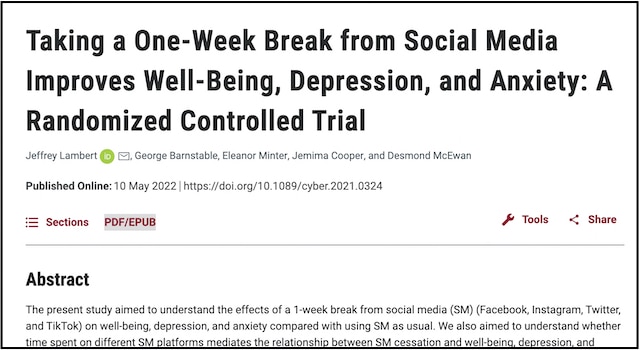

Taking a Break from Social Media Makes you Happier and Less Anxious
source link: https://www.calnewport.com/blog/2022/05/16/taking-a-break-from-social-media-makes-you-happier-and-less-anxious/
Go to the source link to view the article. You can view the picture content, updated content and better typesetting reading experience. If the link is broken, please click the button below to view the snapshot at that time.
Taking a Break from Social Media Makes you Happier and Less Anxious
May 16th, 2022 · 3 comments

In my writing on technology and culture I try to be judicious about citing scientific studies. The issues involved in our ongoing wrangling with digital innovations are subtle and often deeply human. Attempts to exactly quantify what we’re gaining and losing through our screens can at times feel disconcertedly sterile.
All that being said, however, when I come across a particularly well-executed study that presents clear and convincing results, I do like to pass it along, as every extra substantial girder helps in our current scramble to build a structure of understanding.
Which brings me to a smart new paper, written by a team of researchers from the University of Bath, and published last week in the journal of Cyberpsychology, Behavior, and Social Networking. It’s titled “Taking a One-Week Break from Social Media Improves Well-Being, Depression, and Anxiety,” and it caught my attention, in part, because of its parsimonious design.
As I reported last fall in The New Yorker, a problem with existing research on social media and mental health is that it often depends on analyzing large existing data sets. Finding strong social psychological signals in these vast collections of measurements is tricky, as outcomes can be quite sensitive to exactly what questions are asked.
This new paper avoids these issues by deploying a gold-standard for studying human impacts: the randomized control trial. The researchers gathered 154 volunteers with a mean age of 29.6 years old. They randomly divided them into an intervention group, which was asked to stop using social media for one week (with a focus, in particular, on Facebook, Twitter, Instagram, and TikTok), and a control group which was given no instructions.
At the end of this week, the researchers found “significant between-group differences” in well-being, depression, and anxiety, with the intervention group faring much better on all three metrics. These results held even after control for baseline scores, as well as age and gender.
The researchers further found that they could obtain smaller, but still significant improvements in depression and anxiety by having users simply reduce the time they spend on Twitter and TikTok. The biggest effects, however, came from full abstention.
Caveat emptor, I don’t know these researchers, nor have I run this work by the experts I trust in the field, so I can’t vouch without equivocation for the strength of its findings. But given the simple study design and the clear effects it revealed, the message here seems to be clear: social media hurts mental health. Which motivates an obvious follow-up question: Why do we insist on still shrugging our shoulders and continuing to treat the use of these tools like some sort of unavoidable civic and professional necessity?
3 thoughts on “Taking a Break from Social Media Makes you Happier and Less Anxious”
-
Shreya says:
This does not surprise me at all. I cut out all social media from my life after I read Deep Work in 2016, and saved myself a truckload of anxiety in the intervening years. My friends occasionally forward twitter threads to me, and I’m struck by how intense and opinionated the most popular ones seem to be. It’s as though they are designed to get a rise out of you and are largely devoid of nuance.
On an unrelated note, are there any managers here from the tech / finance industry who follow Cal’s deep work philosophy? I’d love to trade notes on how you apply his principles to people management. If you’re interested in chatting about it, then please email me at [email protected]!
-
Jr says:
Confirms the results of Amy Cuddys research discussed in her book Presence.
-
Jason McFadden says:
Evidence that people are better off without social media, or at least they’re happier. So is it worth trading mental health for the few benefits of social media, especially when it’s easy to point out that “connecting” and “communicating” digitally can and does still occur outside social media: email, texting phone numbers, blogging, newsletters, stand-alone messaging/group services (maybe Discord for example, though its very name implies a negative towards mental health, maybe Zoom?). And then there’s non-digital means for these too.
Social Media may be the norm, but it’s not necessary.
When trying to show there are digital alternatives or equivalents to social media, even if examples are scarce or weak, rather than resign to using social media, it should be noted that if social media vanished today, both existing and new tools (hopefully not algorithm-based ones) to replace it would quickly arise.
Also, anecdotal evidence: I created my Twitter account in 2012…and after ten years, I deleted it this April. (I also logged off Facebook and turned off most notifications for everything.) In the 3+ weeks since, I definitely feel better, calmer in mind. I’ve been more present for my family, and I’ve been able to have more clarity and focus on other pursuits. My brain feels less…frazzled. I plan to keep at it.
Leave a Reply Cancel reply
Your email address will not be published. Required fields are marked *
Comment *
Name *
Email *
Website
Confirm you are NOT a spammer. Additionally, by using this form you agree with this site's privacy policy and you consent to having your submitted data collected and stored. We promise not to spam you.
Recommend
About Joyk
Aggregate valuable and interesting links.
Joyk means Joy of geeK